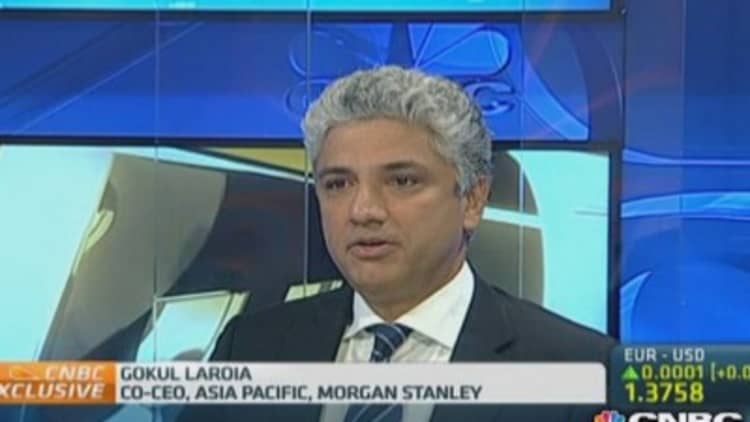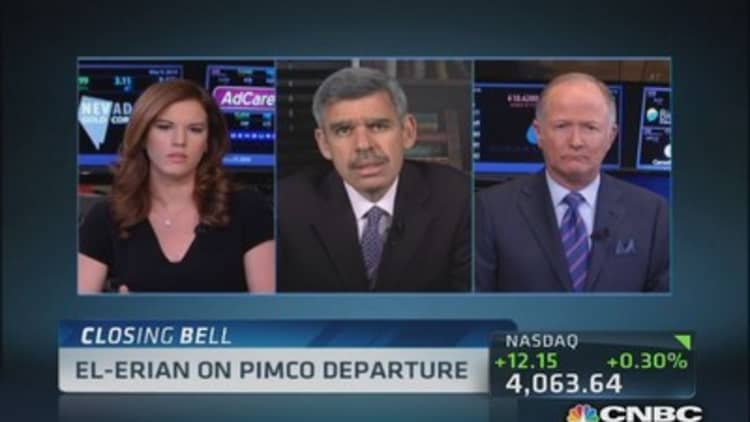
Emerging market assets have suffered through a brutal selloff, but now the sentiment tide is taking a sharper turn toward the once-shunned segment.
"It's been a tough 12-18 months for emerging markets. We find that positioning in these markets just broadly across the region is at its lowest point in years," Gokul Laroia, co-CEO for Asia Pacific at Morgan Stanley, told CNBC.
"There's good reason for this. These markets are experiencing a growth slowdown. I don't believe that is going to reverse itself anytime soon," Laroia said. But he added, "at this point we feel these markets are under owned for sure, undervalued selectively and present opportunity. And over the next 12-18 months, we're very positive. We think that this cycle is going to turn."
Read MoreHas the emerging market buying moment arrived?
Emerging markets took a beating early this year after sharp falls in the value of the Argentine peso, Turkish lira, South African and Brazilian triggered panic selling across the asset class, with analysts largely blaming the turbulence on the Federal Reserve's move to begin tapering its asset purchases.
Since March, protests and fighting in Ukraine have also weighed on the segment. So far this year, around $24 billion has flowed out of emerging market equity funds and $7.29 billion has exited emerging market bond funds, according to data from Jefferies.
This followed a tough 2013, which saw $14.1 billion exit emerging market equity funds, while $14.04 billion said good-bye to the segment's bond funds, according to data from Barclays.
Read MoreHedge funds sit out the emerging market turmoil
Morgan Stanley expects funds will return, but the pace will depend on how quickly emerging market economies' planned reforms materialize.
Laroia sees India as a clear example, as expectations for a clear election outcome and improved policy making have pushed up the country's stock market by more than 20 percent in U.S. dollar terms over the past couple months.
"Imagine what would happen if that were to actually did materialize and there was policy reform that actually followed an electoral outcome," he said.
Read MoreIs the emerging market rally a flash in the pan?
For China, another emerging market powerhouse, he expects investors are waiting for signs the consumption economy is becoming a sustainable growth driver. "It's not immediate catalyst. It will take a little bit longer, but as they get more convinced of that, money will begin to come back again," Laroia said.
To a certain extent, the tide is already turning. While year-to-date fund flow totals for emerging markets remain in negative territory, over the past six weeks, emerging market bond funds have seen $4.9 billion in inflows, and over the past four weeks, $1.56 billion has flowed into the segment's equity funds, according to data from Jefferies.
Some expect the inflows will continue.
Read MorePimco's bad bets on emerging markets add to firm's troubles
"It is time to turn outright bullish again on global emerging markets," Benoit Anne, head of emerging markets strategy at Societe Generale, said in a note Monday. After the bank turned bullish on emerging market fixed income in March, "we now stand ready to extend our bullish call to all emerging market asset classes. This global emerging market rally has more legs to go, to be measured in months, and not simply in just a couple of weeks," he said.
Anne believes emerging market assets are cheap and while economic growth has been disappointing, it's also likely at a bottom.

"What is important is that real-money investors are predominantly behind the recent pick-up in inflows, and we now await a more active participation on the part of hedge fund investors. Finally, valuations are quite compelling in a large number of markets," he said.
Read MoreHuge institutions bullish on 'beaten up' emerging markets
To be sure, not everyone is advocating putting chips back on emerging market assets.
"It's not risk free to invest in emerging markets and you have the occasional more recently quite frequent political situations there," noted Mikio Kumada, global strategist at LGT Capital Partners, which manages more than $25 billion. He cited concerns over the turmoil in Ukraine. "We still prefer, for those reasons, the developed economies," Kumada told CNBC.
—By CNBC.Com's Leslie Shaffer; Follow her on Twitter @LeslieShaffer1


